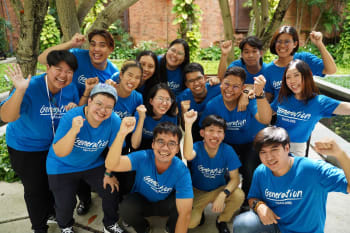Generation Global Alumni Survey confirms upward economic mobility for graduates

The 2023 Global Alumni Survey provides rich insights into the lives of more than 3,000 Generation graduates from 14 countries who completed our programs two to five years ago – spotlighting the enduring impact of Generation’s programs on employment and financial well-being.
“We believe in the power of employment to change lives,” said Generation global CEO Mona Mourshed. “So in addition to tracking our graduates’ employment right after our program, we continue to understand what their lives and careers look like two, three, four, and five years later. Our annual alumni survey measures the durability of our program impact on personal and financial well-being, and we are thrilled to see that our alumni continue to thrive years after they graduate.”
Key insights from the survey include:
Generation learners have different economic mobility journeys
A learner from one country is likely to have a different lived experience than a learner from another, and their respective journeys to employment and lasting financial health will be influenced by where they come from. Generation offers programs in countries that are designated by the World Bank as being lower-middle, upper-middle, and high-income countries, and this year, 37% of respondents came from lower-middle income countries, 45% from upper-middle income countries, and 18% from high-income countries.
Generation graduates around the globe show significant improvements in employment and financial health
In 2023, 71% of alumni are in paid employment (compared with 10% pre-program) – 62% in lower-middle income countries, 91% in upper-middle income countries, and 83% in high-income countries. Globally, 70% of alumni are able to meet their daily financial needs (compared with 33% pre-program). On top of this, 31% are able to save money for the future. Those outcomes are lowest in lower-middle income countries like India and Kenya where graduates tend to be younger, have a lower level of education attainment, and a larger household size. The most commonly-cited savings goals for all alumni are investing in better quality housing or home ownership, supporting their families, and purchasing essential items like household appliances.
Alumni also tell us that since graduating from Generation, they have been able to do things like start or grow their families (70%), invest in better healthcare (68%), and support further education for themselves (66%). These investments have a real impact on graduates’ lives and the lives of their family members and communities.
The majority of Generation graduates work in high-quality jobs
We asked alumni to rate their satisfaction with various elements of their job including pay and benefits, job stability, workplace engagement, and prospects for career growth. Using a rubric similar to Gallup’s Great Jobs Survey we found that more than half of alumni reported an overall score that indicates a high-quality job.
More objectively, we believe that a key indicator of job quality is that it pays a living wage. In 2023, 58% of employed alumni in lower-middle income countries, 98% of employed alumni in upper-middle countries, and 74% of employed alumni in high-income countries earned a living wage.
Generation technology programs can improve parity in outcomes for women, non-degree holders, and midcareer alumni
Generation technology graduates around the world experience strong and stable employment and financial outcomes (2-5 year employment rates range from 84-88%, and self-reported financial independence in the same time frame ranges from 79-85%).
Compared with our global program portfolio, the employment gap between men and women working in technology is lower (84% of women and 86% of men technology graduates are in paid work), and so is the employment gap between non-degree holders and degree holders (82% of non-degree holding and 88% of degree holding technology graduates are in paid work).
Midcareer learners (those aged 40+) working in tech experience strong financial health on par with their younger peers, with 81% able to cover their daily financial needs (compared with 84% of alumni under 40 years old) and 55% able to save money (compared with 61% of alumni under 40 years old).
Generation graduates have a unique, valuable perspective on pressing global issues
Generation alumni differ from one another in numerous ways, including by home country, educational background, native language, employment industry, role, and more. They are united by their experience of striving for a better career and life. In this way, they represent a cross-section of global entry-level talent, and offer a unique perspective on current affairs.
This year, we asked alumni about how the global high-inflation economic environment affected their financial health and savings goals, and 88% of alumni acknowledged that price increases have caused moderate or severe hardship for themselves and their families.
Alumni want to give back to Generation and help shape our programs
We receive a high response rate on alumni surveys and this enables us to better plan our programs, adjust in-class instruction, develop support offers for graduates, and more.
In fact, 84% of alumni want to give back to Generation by recommending their peers to a Generation program, hiring fellow Generation graduates at their companies, and supporting our operations as mentors, instructors, and volunteers. One initiative launched in response to this feedback is the Global Alumni Ambassadors Council, which is in its second year.
We invite you to explore the survey further here. For enquiries about our survey and/or our alumni, please reach out to alumni@generation.org.